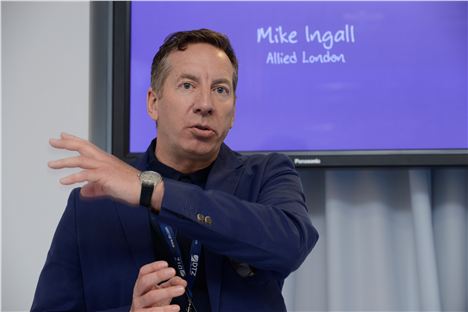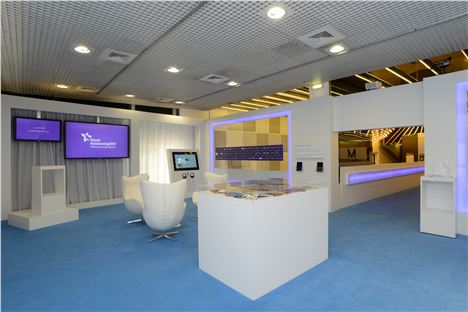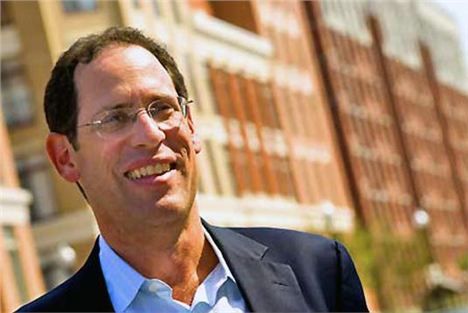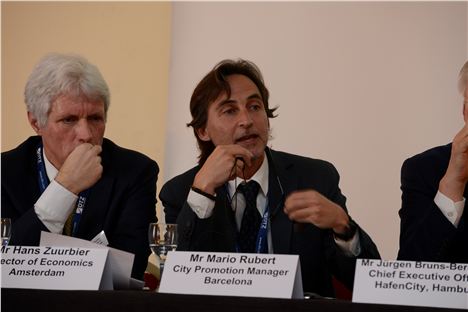THERE was a certain joie de vivre about Manchester at MIPIM this year.
There is a sense that as well as being on the brink of the next big thing there is also a changing of the guard.
An exultation of spirit that something big is about to happen, that the city is once again on the cusp of transformational change and investment.
Not Northern cockiness but city confidence that after six years of re-thinking strategies and painfully dragging development along the track they have finally reached the top of the first Big Dipper ascent and the whole rollercoaster of redevelopment is about to surge forward again.
Only this time they want to do it better.
Mike Ingall, chief executive of Allied London, a man not usually given to giddy hyperbole, described it as a return of the golden era, a new Cottonopolis, when Manchester ruled the world only this time with shiny towers replacing the smoking chimneys of industry."
Mike Ingall
As the man in charge of the redevelopment of the Granada TV site he will be playing a pivotal role in this new phase, turning 15 prime acres into St John’s Quarter, a new city village, a residential neighbourhood that hopefully will offer more comfort and soul than the business like Spinningfields.
Because people are going to be the key to the city’s resurgence Manchester city centre has a problem. It struggles to accommodate the 20,000 or so souls who live there now.
Given that this number is going to more than double in the next 10 years, providing enough new homes of the right size and cost both to buy and to rent is going to be the big challenge. I hope they don’t cock it up.
In his Confidential Q&A Sir Howard Bernstein agreed having the right mix of housing will be crucial to the city’s future success and talked of the best principles of design and place making.
But on the first day in MIPIM residential was relegated to a bit part on the mood boards of the city’s success over the last 25 years.
You could just about spot it, top right, listing just five developments - Faulkner Court, No1 Deansgate, Piccadilly Village, Granby Village and Lancaster House. One I had never heard of, two are taking their management company to task and another is continuing court action to get down maintenance charges.
Not exactly a roll call of honour.
Strange choices in a city that does have better than this and in the future will hopefully have much better. Manchester must be as ambitious in its delivery of new housing and place making in the next decade as it has in its delivery of business and education in the last.
The big talk is all about PRS – as if the private rental sector has only just been invented. It’s currently being reinvented because the big money men, the pension funds and the investment pots are seeing housing as the next gilt edged yield if only they can get the numbers big enough to deliver economies of scale.
Manchester stand MIPIM
Government funding through the Homes and Communities Agency’s ‘ Build to Rent’ pot helps too.
Expect to see any vacant land in the sweep from Victoria to Piccadilly earmarked for PRS.
It will work if the standard of housing on offer is improved, if the city demands that developers take a little less profit and put a little bit more in to both the quality of the buildings and the finish and the public realm that surrounds them.
No more mean spaces where sharers have to fight over the one decent double, no more cell like windows and lack of light, nor long corridors and poor insulation.
The new homes being built in Manchester in the next decade should be efficient, in their use of space as well as heating and ventilation, they should have access to open space either on roof gardens, individual terraces or larger communal gardens and be built to the highest standards with water tight guarantees should anything go wrong then someone will be held accountable.
Look at the back pages of the Sunday Times Homes section and London developments boast not just a concierge and valet parking, gym and swimming pool but on-site business centre, a cinema, virtual golf, private courtyards.
Surely it’s not too much to ask for decent security, a coffee shop/meeting room and laundry. Although I am told laundries are nothing but trouble to manage.
Mike Ingall believes that people of all ages are keen to move back into an urban environment. He said: “I do not think that people are actually that keen on mowing the lawn and washing cars.
“They want to move back to the city and live and work in one place.
“It’s a privilege for us to have won the Granada site, an asset with such history, wealth and heritage and we want to reinvent this already resonant place.
“We have had some very good ideas from masterplanners and architects but what is more important for me is to create something that is investable. Anyone can draw tower blocks and do CGIs but will they attract the world’s capital?”
David Partridge, Sir Howard Bernstein and Wang Weibo
Ah money.
It is interesting that apart from a couple of obvious exceptions, Bruntwood being one, many of the schemes currently on the drawing board will be pushed to the line not by bank funding but by institutional investment.
One of the funds having a chat with Manchester last week was Henderson, owners of the Ancoats Retail Park, one of the key sites able to unlock the true potential of New Islington.
Please God they can be persuaded to abandon their current uniquely uninspired plans to simply revamp the sheds and build a supermarket and cinema.
This site should be reborn with new streets of housing running into New Islington at right angles to Great Ancoats Street, leading you into the rather lovely Cottonfields Park and the new school and the canals. Opening up the area where a fortune of our money has been spent on infrastructure but which mainly remains hidden from view.
Build a supermarket but make it an environmentally green one so it serves the new neighbourhood and the emphasis is on accessibility by foot and bike and not by car. Build a cinema, everyone loves a film, but scale it down to fit the location.
I skipped off Cannes and spent an afternoon in Nice, to look in envy at how the centre has been transformed with a linear park running through its heart and taking the slickest of chic trams which make Manchester’s yellow clunkers seem ancient.
The Nice tram system is effortless and efficient, it blends into the cityscape, level with the streets, subtle rises in pavement levels enabling you to step on board not climb.
The park is a proper park. Grass and trees and play equipment and lots of benches and statues and fountains at one end. It lets the city breathe and play. It will be interesting to see how Manchester’s St Peter’s Square, which will have the same components, compares on completion.
Cities are the powerhouses, the economic drivers of countries and, while others have stood back, Manchester has kept on delivering. It sees the sense in collaboration, in a focussed northern voice able to exert unified pressure on Westminster’s purse strings.
Hence a joint presentation by Liverpool and Manchester on HS2 and the Atlantic Gateway, co-operation and support for the Liverpool based Festival of Business this summer.
Other towns within Greater Manchester can join if they wish. Stockport’s chief executive Eammon Boylan was on the Manchester stand talking about the Combined Authority’s investment strategy and the trials and tribulations of trying to get a region wide development framework approved.
Keith Davies, director of Development and Regeneration at Bolton, in Cannes to talk about Logistics North, has always got the importance of collaboration with its powerful neighbour.
Salford has had representation in the past but was absent this year and the plans released mid week for the replacement building at Rali Courts shows just how far out of touch it looks with Manchester’s extended ambition.
Bruce Katz
Bruce Katz, a respected economist and author of the Metropolitan Revolution is also a quotable speaker. He believes the US government is no longer fit for purpose being little more than “a health insurance company with an army.”
Cities are the new power brokers, generating two thirds of all global wealth and they have to find their niche.
“In the words of Dolly Parton – Find out who you are and do it on purpose,” says Bruce.
There were 60 businesses partnering Manchester in MIPIM this year. The minimum £6,000 a head plus accommodation costs and flights is not an insignificant sum and many were new.
There is a sense that as well as being on the brink of the next big thing there is also a changing of the guard.
SHB may be staying put at the Town Hall but there is a new order amongst those delivering projects now and a new mind set. The old protagonists were still in Cannes but they often cut solitary figures.
Manchester developers like Capital and Centric are doing speculative builds to create spaces and 5plus Architects, again rooted in the city but London savvy, are designing stunning new buildings to enhance the city and cleverly reconfiguring old ones. Urban Bubble, founded from nothing by Michael Howard, has thankfully raised the bar on property maintenance. New faces, new standards, new ambition.
Mike Ingall opened his MIPIM stance with a petty remark denigrating Property Week for profiling: “a bookie and a footballer ” in a recent feature on Manchester.
It was a mean and ungenerous comment, especially given Gary Neville’s input was one of the highlights of Manchester’s week. Insightful, intelligent, knowledgeable, funny and committed to developing and investing in Manchester, the city should be delighted he is now playing for them. He's shown on the top picture with Mike Emmerich of New Economy.
And they should already be planning to get Fred Done out there next year.
All the bigwigs gather for Manchester















